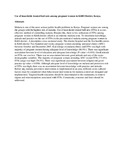| dc.contributor.author | Njoroge, F.K, | |
| dc.contributor.author | Kimani, V.N | |
| dc.contributor.author | Ongore, D. | |
| dc.contributor.author | Akwale, W.S. | |
| dc.date.accessioned | 2013-04-26T06:20:44Z | |
| dc.date.available | 2013-04-26T06:20:44Z | |
| dc.date.issued | 2009 | |
| dc.identifier.citation | East Afr Med J. 2009 Jul;86(7):314-22 | en |
| dc.identifier.uri | http://erepository.uonbi.ac.ke:8080/xmlui/handle/123456789/16908 | |
| dc.identifier.uri | http://www.ncbi.nlm.nih.gov/pubmed/20499780 | |
| dc.description.abstract | Malaria is one of the most serious public health problems in Kenya. Pregnant women are among the groups with the highest risk of malaria. Use of insecticide treated bed nets (ITNs) is a cost-effective method of controlling malaria. Despite this, there is low utilisation of ITNs among pregnant women in Kilifi district which is an endemic malaria zone.
To determine knowledge, attitude and practice on the use of ITNs in the prevention of malaria among pregnant women in Kilifi district.
A descriptive cross-sectional study.
The district hospital and the five health centres in Kilifi district
Two hundred and twenty pregnant women attending antenatal clinics (ANC) between October and December 2007.
Knowledge on malaria illness and ITNs was high with majority of pregnant women having adequate level of knowledge (86.9%). There was significant association between level of education and adequate knowledge (P-value = 0.010). Good attitude on ITNs use was low. There was no association between good attitude and any of the socio-demographic variables. The majority of pregnant women attending ANC owned ITNs (75.4%). ITNs usage was high (70.5%). There was significant association between religion and good practice (p-value = 0.050). Although adequate level of knowledge on malaria and protective role of ITNs was high, there was no association between knowledge with practice and attitude.
Before any malaria preventive intervention is implemented in an area, different socio-cultural factors must be considered when behavioural interventions for malaria control are designed and implemented. Targeted health education should be disseminated to the community to remove stigma and misconceptions associated with ITNs. Community concerns and fears should be addressed. | en |
| dc.language.iso | en | en |
| dc.title | Use of insecticide treated bed nets among pregnant women in Kilifi District, Kenya. | en |
| dc.type | Article | en |
| local.publisher | Department of Community Health, College of Health Sciences, University of Nairobi, | en |

